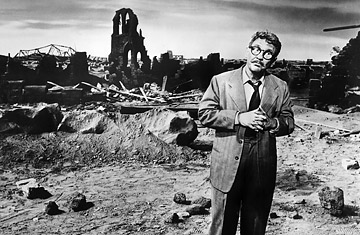
The Twilight Zone, Episode 'Time Enough At Last' aired November 20, 1959.
I was playing in a company softball game in New York's Central Park, on of one of those few brilliant blue evenings that make the city temporarily seem like a livable place in the summer. I'd been stationed deep in right field, so naturally my thoughts began to migrate to subjects other than the game before me. I watched the tall trees sway in the breeze, and was instantly gripped by dread. For this, like much else, I blame M. Night Shyamalan. Those who've seen his most recent film, The Happening, know why. The eco-pocalypse is coming and it's all the fault of the trees, which kill everything in sight (including, apparently, Shyamalan's film career). You'll never look at an oak wavering in the wind the same way again.
But it's not just my cinematic diet that tends to turn my thoughts dark. Environmental reporting will give you an apocalyptic mind-set. There's the melting Arctic ice and rising sea levels; torched rainforests and polluted Chinese megalopolises. Animals going extinct — gone forever, a mini-apocalypse — up to 10,000 times faster than the rate believed over the past 60 million years. When we talk about climate change, we're not just talking about rising temperatures or altered landscapes. We're talking about the end of human civilization as we know it. That's what all those PowerPoint slides in An Inconvenient Truth add up to. That's the truth — that through our day-to-day consumerist lives, we may be creating the conditions for our own end. So, as you can see, it's not the most life-affirming reporting beat out there.
That's why I like Rob Kutner. Kutner is a staff writer for The Daily Show, surely one of the most important jobs in fake journalism. He's just written a book called Apocalypse How: Turn the End-Times into the Best of Times. While most creative works about Armageddon (The Day After Tomorrow, Omega Man, The Road) tend to be bummers, heavier on cannibalism than comedy, Kutner's book is a lighthearted romp that looks on the bright side of the end of the world. Yes, it's a shame that a Christian Rapture could teleport all the godly elect into heaven, leaving sinners (like yourself) to suffer a millennium of "Satanic chastisement" — but on the plus side, the raptured supposedly leave their clothes behind. "Just think of it," Kutner writes. "Any clothing item you want, direct to you by Heavenly consignment." And if that's not enough, worldwide annihilation will lead to a power vacuum you can fill with the government of your choice — like Kutner's Femocracy, led by the Gal-Pal-iament, "a semi-secret body of whispered caucuses and innuendoes, whose members are not formally voted in or out, but somehow just know it."
Kutner might not appear to be taking the apocalypse seriously — this is, after all, a man whose day job at The Daily Show involves reading depressing news and transforming it into "poop jokes." (Hear Kutner ponder the apocalypse on this week's Greencast.) But though the book is inspired comedy, Kutner says the theme came from his own preoccupation with the possible end of the world. He has a "go bag" — a collection of items needed in case of an emergency evacuation — and he calls himself and his wife "apoca-nerds." He looks around the landscape of American popular culture and sees a country that shares that obsession with end times: think of the Christian Left Behind series of novels, which have sold more than 60 million copies, or TV shows like Jericho, set after a nuclear war. "We're in this nebulous new age where the Cold War, which defined the second half of the 20th century, is over," says Kutner. "But the good times are over. The global economy is starting to fracture and it seems like no one is in charge anymore. It's all bummer indicators."
Which brings us back to the environment, the bummer indicator to end all bummer indicators. If nuclear annihilation was the apocalyptic mainstay through the decades of the Cold War, the eco-apocalypse has clearly taken its place. In some ways, the "Al Gore Scare Machine," as Kutner puts it, is more of the same. Like nuclear war — or like the more fantastical possibilities that Kutner imagines, such as a robot uprising or an unleashed super-plague — global warming will be an apocalypse of our own making. End times stories are tales of sin punished, and climate change is no different. It's just bigger — we're all digging our own graves, with every mile driven and every last bit of air conditioning.
But I'm not sure that rhetoric is good for the environmental movement. Compared to the instant drama of nuclear war, climate change makes for bad apocalyptic porn, as anyone who saw The Day After Tomorrow knows. Even the worst-case scenarios say that climate change will happen gradually, at least on a human scale. (For climate history, it will occur in the blink of an eye.) Climate crusaders risk being seen as crying wolf should they forecast Armageddon, only to be met instead with a world that remains mostly the same in the short term, especially for the rich — but one that gets inexorably worse, especially for the poor. Global warming is very scary because once it truly gets started, we may in the end be helpless to stop it. But fear has never been a very good motivator, especially not for the decades-long societal changes we'll need to make to slow climate change. Instead of the apocalypse, what we need is positivity. A low-carbon world will bring benefits that go well beyond simple survival, and that's a message that needs to be heard. But if it really is that bad and the end of the world is nigh — well, at least we'll have Kutner's book to help us meet the annihilation with a smile.
